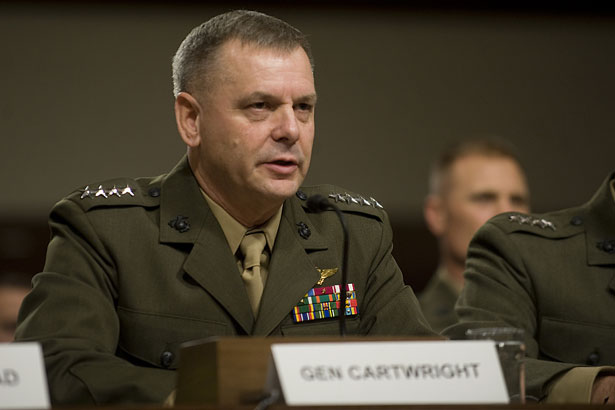
“Obama’s General” James Cartwright. (D. Myles Cullen/Courtesy of Wikimedia.)
Retired four-star Marine General James Cartwright, who’s been close to President Obama for years—hawkish critics called him “Obama’s general”—has spoken out forcefully against the unchecked use of drones. According to the general, who’s been a long-time skeptic of the war in Afghanistan, drones cause anger, bitterness and resentment among Muslim populations targeted in the attacks, and he suggested that their use will cause “blowback,” i.e., attacks against the United States.
In a speech to the Chicago Council on Foreign Relations, reported by The New York Times, Cartwright said:
“We’re seeing that blowback. If you’re trying to kill your way to a solution, no matter how precise you are, you’re going to upset people even if they’re not targeted.”
Cartwright also said that he wasn’t enthused about the idea of shifting responsibility for drone warfare from the CIA to the military. Recently, the Obama administration has been hinting that it intends to have drone warfare brought under the Pentagon’s control, at least in places such as Yemen—though not, apparently, in Pakistan, where the vast majority of drone strikes take place. But Cartwright said that he’s concerned that there would be a “blurring of the line” if the military takes control of what is essentially a covert program to wage war in countries where the United States is not technically at war.
If the drones are placed more fully under Pentagon control, they’d be under the purview of the super-secret Special Operations Command, which has become a kind of “mini-CIA” inside the Department of Defense.
Perhaps because of his unorthodox views, Cartwright lost a chance to be named chairman of the Joint Chiefs of Staff, and Obama picked General Martin Dempsey instead—even though Obama and Cartwright were close.
Last year, Cartwright came out in support of large reductions in America’s nuclear weapons arsenal. As the Times reported:
General Cartwright said that the United States’ nuclear deterrence could be guaranteed with a total arsenal of 900 warheads, and with only half of them deployed at any one time. Even those in the field would be taken off hair triggers, requiring 24 to 72 hours for launching, to reduce the chance of accidental war.
That arsenal would be a significant cut from the current agreement to limit Russia and the United States to 1,550 deployed warheads each, down from 2,200, within six years. Under the New Start agreement, thousands more warheads can be kept in storage as a backup force, and the restrictions do not apply to hundreds of short-range nuclear weapons in the American and Russian arsenals.
“The world has changed, but the current arsenal carries the baggage of the cold war,” General Cartwright said in an interview. “There is the baggage of significant numbers in reserve. There is the baggage of a nuclear stockpile beyond our needs. What is it we’re really trying to deter? Our current arsenal does not address the threats of the 21st century.”
How sincere was Republican support for Rand Paul's filibuster against drones, Rick Perlstein asks.


